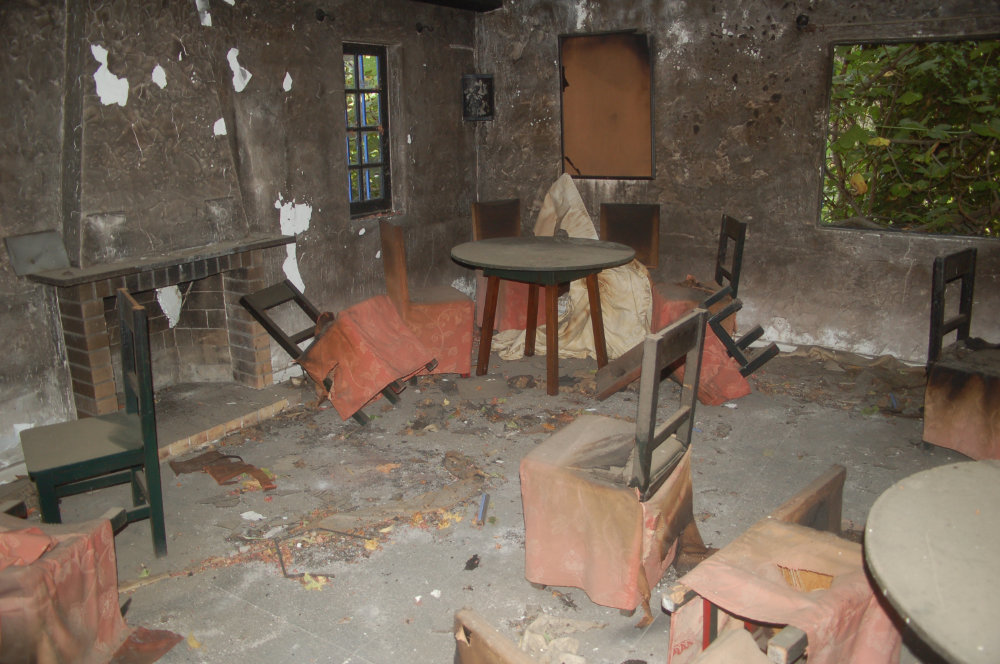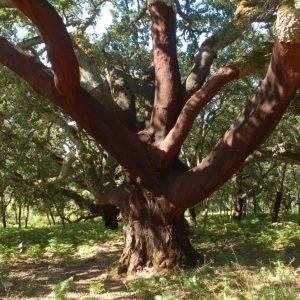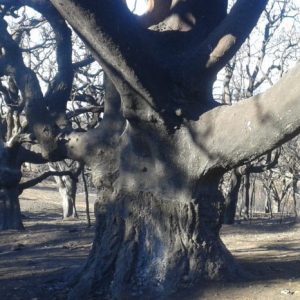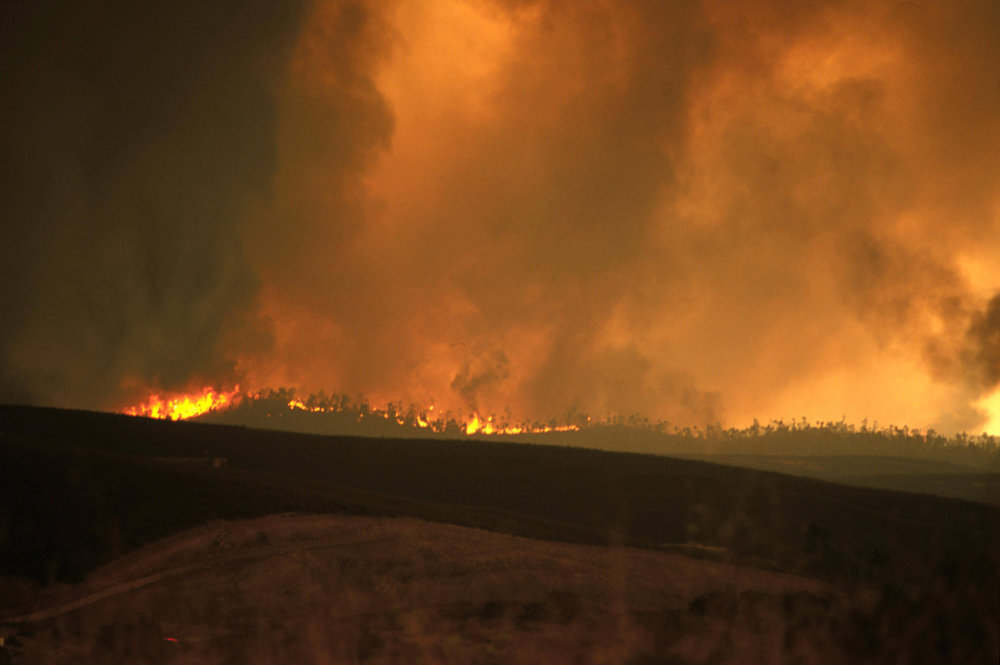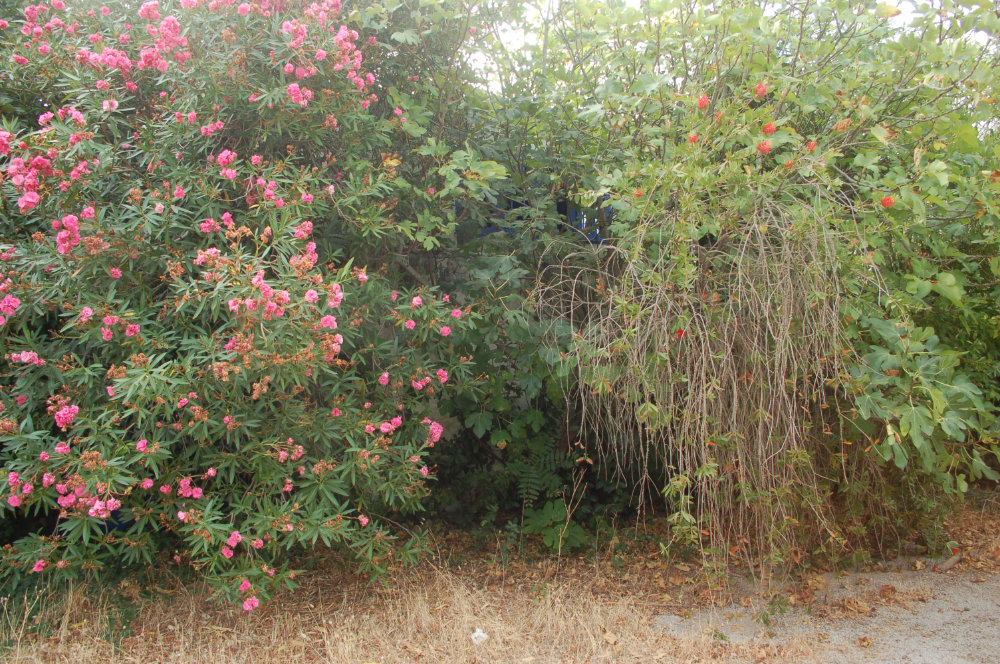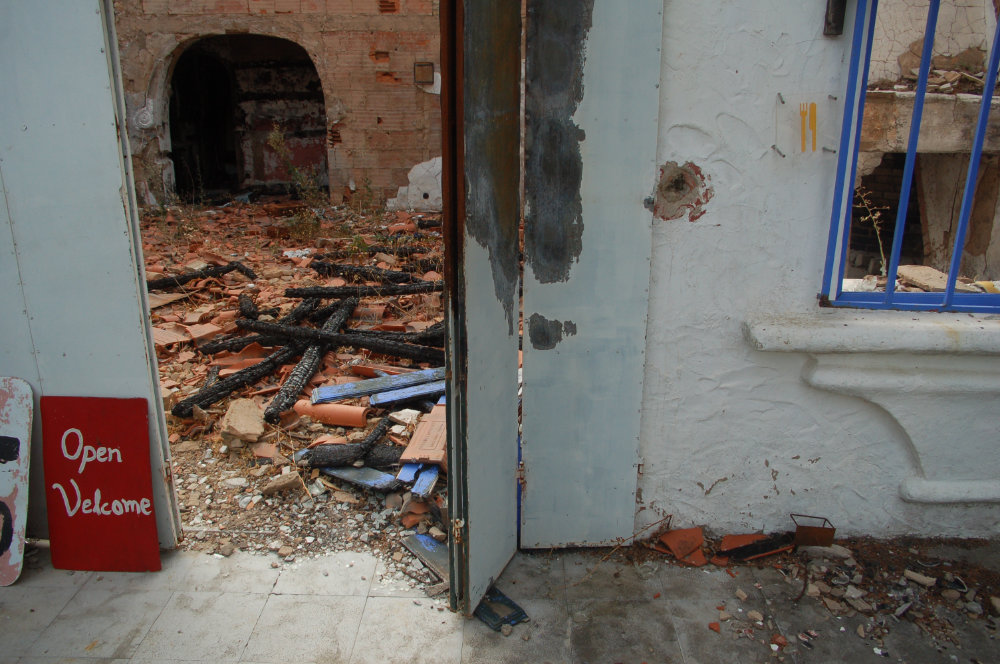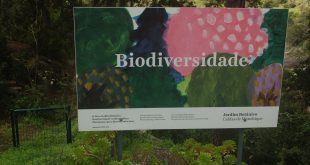Saturday 11th September 2021.
It was in the wake of the major forest fire in September 2003 that I first launched an appeal in the newspaper I was running at the time to help the victims and initiate a reforestation project in Monchique. I visited the new owners of an area called Covão de Águia, who had bought those woodlands, spanning over 60 hectares and including houses and ruins on 5 September 2003 at the notary’s office, with no inkling that their land might burn just one week later. It was a miracle that the house itself hadn’t burnt down and nobody was injured. This is how I came to meet the new owners – two Buddhist monks – in their completely burnt-down forest to ask them whether I could help them clean it up. The first thing they did was to ask me inside for a cup of tea, all very friendly. We were kind of neighbours after all. So I took off my shoes and stepped into the living room in my stockinged feet and sat down in an armchair they’d courteously offered me. Then we proceeded to discuss the relief project.
Why am I writing this? Because Monchique is a place where everyone gets back what they give. I didn’t know at the time that the two monks were running the Dalai Lama foundation in Portugal. Their demeanour moved me. They must have suffered terribly over the past days and weeks. I wanted to show them that they are not alone. And that altruism can take a very practical shape. They accepted that with equanimity.
Actually, on the same day I was asked the same question twice: why was I doing this? What benefit was I getting out of starting a reforestation project after the disastrous forest fires? I was asked the question very bluntly. What’s in it for you? The monks asked me this, as did the lumberjacks out there. I told both that it was giving me pleasure and because I was able to do it. The two monks understood me immediately. One of the Monchique lumberjacks however probed a bit further: and who is paying you for that? I didn’t understand the question immediately and asked him What do you mean by payment? Well, he replied, there has to be some profit in it. It was then I suddenly understood which laws govern work in Monchique. In the broadest sense I was taking work away from them. Neighbours helping each other out seemed to be a thing of the past. You worked and were remunerated for it with money. End of story.
Following a forest fire nature at first is still in shock. Trees are lying all over the place, like after an accident. Birds and animals such as wild boar and sheep are strewn around, dead, partly charred. First, you have to clear a way to reach the disaster zone. The best approach is to hire one or several lumberjacks who’ll take their motor saws into the burnt forest, cutting a way in. Then they cut everything down to the bare minimum and cut out everything that’s still of use: branches of cork oak or medronheiro, trunks of umbrella pines and shrubbery from heather and gorse. When I appealed for help through my newspaper, 20 men turned up, plus two women I hadn’t met before, readers of our newspaper. We introduced ourselves to each other. Everyone had brought a motor saw, with the idea to stock up with firewood for the winter. That was how I’d phrased it in the appeal. There was so much dead wood here. Everyone was able to pile up free firewood for their home in exchange for clearing the terrain of burnt trees. After a few hours of work we looked at each other, laughing. We were as blackened as chimney-sweepers, but every one of us had secured a tree for themselves and chopped it into kindling. Some had brought their trailers and were already loading the wood onto them. The way it normally worked however was that woodland owners would hire one or more lumberjacks, paying them an hourly rate. These would do the work, using chainsaws to cut the burnt wood into logs for the fireplace for the forest owner. Now we were doing that as volunteers, and once the work was done, could simply pack up our logs for the fireplace and take them home. For free.
The two monks brought tea, served with broad smiles. They had enough logs for their fireplace and were only too happy to swap labour against firewood on a voluntary basis. That way they didn’t have to pay anything and we got free firewood. I’d explained to them exactly how later in winter we would replant the burnt-down forest with young native trees … We’d chosen tree species and had arrived at cork oaks and umbrella pines all the way to cedars and cypress trees. So it came to pass that we met on many a Saturday, usually in the morning, to work in the burnt Dalai Lama’s Garden of Eden in Monchique. Towards the end of the year we started laying water pipes from a tank to water the saplings.
Phase 2 had started. All of a sudden we were alone once more. The lumberjacks beat a discreet retreat and didn’t want to help anymore with the planting of the saplings. There was only five of us left. This was how I got my first lesson in neighbourly help in Monchique. Yet our attitude also caught on to some extent. Again and again we’d see two elderly ladies armed with shovels and hoes come in; they enjoyed meeting on a Saturday for a chat and to plant the new baby trees. We did that for a few hours, before taking a break in a nearby café to partake of a medronho with bica, while they would smoke cigarettes with filter tip. This was how we got chatting to each other. Once in a while the monks would drop by bearing cookies, and in that way we got to know each other better, in those breaks from work…
On the inability to mourn. That was something I noticed immediately. Everyone wanted to avoid to talk about mourning and the trauma of the forest fires. Yet the issue would plant itself, legs set wide apart, like a barrier blocking our way. And it kept saying the same thing: if you want to reach your goal you have to mourn the loss of nature. You have to talk to each other about what you’ve lost and what you are missing. Most people didn’t know what to do with that advice, carrying on as before. After a short while, when the chaos in the forest had been set to rights once more, everyone preferred to look ahead rather than dealing with „yesterday“. Too painful, was what some said. Mourning would have gone hand in hand with a head-on analysis of the reasons why the forest had burned. That would presumably have been even more painful. Thus, everything stayed how it was, and the fire returned in 2018. That was foreseeable; in fact, people seemed to be kind of waiting for it even… People harbour a yearning for oblivion. The wounds of those who’ve survived five or six forest fires bear thick scars; the next time they’ll protect themselves as best they can. Which however is not the same as the ability to mourn.
If we attempt a conclusion, look at the damage, noting down each detail as on an accounting sheet we’ll notice that there is something fundamentally rotten in Monchique. At a subconscious level everyone knows that, but no-one wants to say it out loud. And yet we have to utter that word and think about it together. Nature has a value that we cannot weigh up in money. No money in the world can replace our forests. We know that all too well. A house may be valued, but if we’re talking about a tree an argument starts up straightaway. The best way to avoid discussing litigation value, whether a tree still belongs to my land or already to your neighbour – is to buy the tree, saving it from the motor saw. But that’s only a sleight of hand really.
Let’s be honest here. A tree has immense immaterial value. It offers beauty, a commodity required by nature tourism. What is the price of its shade, its roots regulating the water supply? How much do you pay it for its fruit and for providing a barrier against the wind? No insurance pays out for a tree. You can only insure a house and its contents, or a garden hose, a parasol, but nature is priceless. Which is why the damage following a forest fire is so immense: part of the damage is of an immaterial kind. One example: let’s say you have lost 289 cork oaks. They were last stripped five years ago and would have been ready again for stripping in another five years’ time. Five years ago you earned 29,000 euros from that; now you will find yourself without income in five years’ time when harvest time comes around again cork. What however is the value of the tree independently from the income it guarantees you? Thirty years are needed before it’ll give you your first cork, after that it will be stripped every ten years in Monchique. Which is why the tree is even more valuable, as its cork has a higher value than in other places where the bark is peeled every nine years.
Forest fires bring the death of many old people in their wake. In Monchique I can see the diseases erupting after forest fires. My neighbour Carlos dies in the winter of 2018/2019 of cancer. Another neighbour takes his own life. The forest is dead and humans die with the forest. The lives of humanity and the forest go hand in hand and move in circles in tune with the seasons. Even if we deny that the forest touches us on an emotional level, it does touch us deeply and leaves its mark on us. We have to ask ourselves the question, approaching it in a roundabout way, on tiptoe, hesitantly and carefully. The question is: what does the forest mean to us? What significance does the forest have for humanity?
A burnt forest is black and I am filled with horror seeing all these dead fellow beings buried in this huge amount of cinders. For me a tree is first and foremost a green being, my faithful companion during all those years. Running away is not an option for it. It stands where it stands and has always stood. Take this ancient 2,000-year old cork oak in Corte Grande, which nobody protected while everything was burning around it. Its value is truly incalculable. So if this is the case, why do we expose it to the laws of the market and monetary economy, the laws governing limited companies and financial economics? And why do we plant a eucalyptus forest 250 metres away from an iconic tree and sell a ton of eucalyptus for 16 euros and 75 cents? Let’s run a comparison: the owner of a piece of woodland receives as much as 17 euros for one arroba (15 kg) of carob. Why do we measure the weight of a tree, turn it into wood, value it again, to allow it to be felled by a lumberjack with a motor saw every few years and sold? Only for it to regrow. Because Navigator turns it into paper or IKEA into chairs and tables? And why do we speculate with trees? With eucalyptus yes, but not with an olive tree. This inherent contradiction is not productive. We need to unravel it. In doing so we can’t help but shift from monoculture based on market constraints to biodiversity grounded in nature. There is nothing left for us but to deeply mourn the loss of a tree or a forest, and if we then understand what we have to do, the obvious solution is close to hand. Forest is Conservation pure and simple. We mustn’t turn it into money. Live trees should not be allowed to be felled, as they are our friends and shape the climate by turning CO2 into oxygen. You don’t plant trees just to chop them down again a few years later, one of the reasons being that a monoculture by default represents a danger for nature. The reason you don’t plant a eucalyptus tree on each square metre is that it will become a fire risk for all your neighbours. Eucalyptus burns well, and its oil content turns it into a liability. A fast-growing tree, after three years it draws 60 litres of groundwater per day out of the soil. And because this is now common knowledge, companies such as Navigator are looking for pertinent arguments to promote it. Eucalyptus, they claim, is a good tool for combatting climate change, as it grows fast and quickly takes CO2 out of the air and transforms it. However, what they don’t mention is that during a forest fire, for each km² of woodland, 20,000 tons of CO2 are emitted into the atmosphere…
And because we know that eucalyptus is only planted to satisfy the interests of a paper manufacturer, because we know it to be highly inflammable and a fire-starter, because we know eucalyptus to have a noxious effect on forest soil, drying it out, but because we can earn money with it without having to work hard, for that exact reason we take a risk „into account“. This inherent contradiction is one that the politicians face at the local elections. The question is a tricky one. Will it attract clear statements or continued lies?
ECO123 asks the politician André Varela (CDU) how in his opinion the forest fires might be stopped, and he doesn’t turn up for the interview. He refuses to be interviewed, unable to give an honest open answer to a straightforward question. The only way he will agree to reply is in writing. These issues being uncomfortable ones, an open chat is presumably too difficult to contemplate. The politician who wants to become mayor of Monchique passes up the historic chance these elections provide to obtain more than the meagre 4,07% or 140 votes his party, the CDU, gained in the last elections in 2017. ECO123 wants to ask him about the importance his party accords to the Monchique forests, and how forest fires might be stopped? This question is legitimate, and one that all citizens of Monchique want to hear politicians answer. André Varela however demands that ECO123, who are inviting him to an interview, sends in all questions in writing ahead of our meeting, otherwise he’ll be obliged to take his distance. This makes him the only candidate who is not prepared to face professional questioning and doesn’t turn up at the stipulated day and time. We were waiting for him on Saturday 28 August at 9am at the Rouxinol restaurant. Senhor Varela passed up the appointment and the opportunity to talk to the press. At 9.45am we returned to the office. In Monchique everyone gets back what they are prepared to give.
 Eco123 Revista da Economia e Ecologia
Eco123 Revista da Economia e Ecologia

